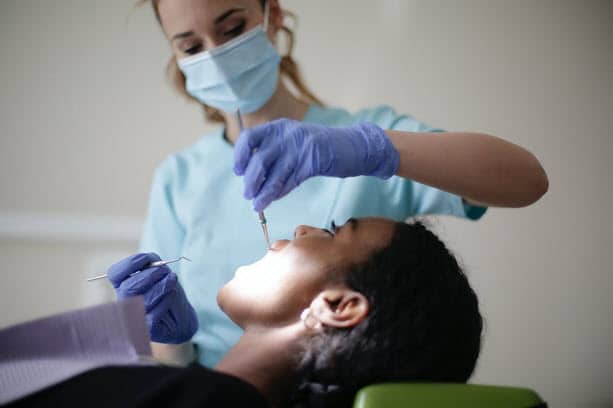According to a new study, individuals with periodontitis (severe gum disease) appear to be at greater risk of having severe complications if they contract Covid-19.
It is estimated that three in ten adults have gum disease in Australia. So, now more than ever, it is essential to focus on improving and maintaining your oral health.
The Australian Institute of Health and Welfare reports 72,000 hospitalisations for dental conditions that may have been prevented with earlier treatment. Regular check-ups and cleans with your dentist allows them to assess your mouth and overall oral health. Your dentist can then create a customised treatment plan to optimise your oral health.
Scientists have researched why Covid-19 patients are at high risk of developing severe complications due to poor oral health.
What Can Gum Disease Indicate?
Gum disease is inflammation and infection of the gums and supporting structures around your teeth (ligaments and bone). Signs of gum disease may include bleeding gums, bad breath, loose teeth and receding gums. It can be an indicator of inflammation throughout the body, which can be more serious than it might seem. Gum disease has also been linked to other severe conditions such as diabetes, heart disease and Alzheimer’s.
A study looking at patients with Covid-19 found that patients were three times more likely to have severe Covid-19 complications such as admission to intensive care, need for assisted ventilation or death with respiratory issues and other difficulties if they also had periodontitis (gum disease). The researchers also found that these patients also had biomarkers associated with worsening outcomes from Covid-19.
There’s also evidence that Covid -19 patients with gum disease are nine times more likely to result in death. A study found this may be due to patients on ventilators with periodontitis being at increased risk of inhaling oral bacteria that can infect the lungs.
These statistical realities underscore the importance of maintaining good oral health throughout the pandemic, having regular check-ups and cleans with your dentist, and addressing any gum disease symptoms you may have with your dentist.
What Other Symptoms Are Associated with Gum Disease?
Gum disease can be associated with bad breath and bleeding gums, so it’s something that you should address as part of your general dental care and treatment plan. In severe cases of gum disease, it can lead to the loss of teeth.
Gum disease has been linked to diabetes, Alzheimer’s disease, and heart disease and is associated with pneumonia, asthma, and chronic obstructive pulmonary disease (COPD). Gum disease is serious, which is why it’s so important to brush and floss your teeth daily. You should follow your dentist’s recommendations regarding brushing techniques and any extra measures like mouthwash that may help you reach optimal gum health.
How to Prevent Gum Disease
So, how do you prevent and minimise the effects of gum disease? Here is a list to help you on the path to great oral health:
- Brush your teeth twice a day. Make sure that you clean your entire mouth, including the more challenging to reach back teeth.
- Floss. Try to floss daily. Floss helps to get to those areas that just can`t be cleaned by your toothbrush, such as in between your teeth.
- Be aware of risk factors. Depending on your age and other risk factors, you might be more susceptible to having gum disease, particularly if you smoke, have diabetes, or your family has a history of gum disease.
- See your dentist regularly. Can you remember the last time you saw your dentist? Your dentist can check not only your gums but also your teeth, bite, bone structure, and other factors that contribute to having optimal oral health.
The team at Beaches Dental Mona Vale is here to help you. Our friendly and caring dentists work with you to help you achieve your dental goals by creating personalised treatment plans to meet your specific needs.

